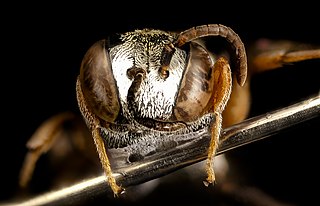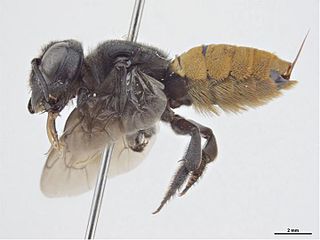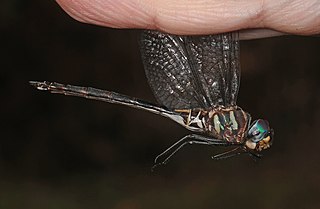 W
WAustrogomphus gordoni, also known as Austrogomphus (Xerogomphus) gordoni, is a species of dragonfly of the family Gomphidae, commonly known as the western red hunter. It inhabits streams and pools in Western Australia.
 W
WCardiaspina fiscella, the brown basket lerp or brown lace lerp, is a jumping plant louse species in the genus Cardiaspina originally found in Australia. It spread to New Zealand where it was found in 1996 near the Auckland airport. It feeds on eucalyptus, especially swamp mahogany, and is found in Victoria, eastern New South Wales, and southeastern Queensland, as well as the capital territory (ACT) around Canberra and on Norfolk Island. Cardiaspina fiscella has five nymphal instars, and as the instars moult they add a layer to their outside covering (casing), known as the "lerp".
 W
WEpeolus canadensis is a species of cuckoo bee in the family Apidae. It is found in North America.
 W
WEpeolus carolinus is a species of cuckoo bee in the family Apidae. It is found in North America.
 W
WEpeolus howardi, or Howard's cellophane-cuckoo bee, is a species of cuckoo bee in the family Apidae. It is found in North America.
 W
WEuodynerus schwarzi is a species of stinging wasp in the family Vespidae.
 W
WHeteroponera flava is a species of ant in the genus Heteroponera. Endemic to Brazil and Paraguay, it was described by Kempf in 1962.
 W
WHeteroponera mayri is a species of ant in the genus Heteroponera. Endemic to Brazil and Paraguay, it was described by Kempf in 1962.
 W
WLepidophora lutea is a species of bee flies in the family Bombyliidae.
 W
WMagicicada septendecula is a species of insect in family Cicadidae. It is endemic to the United States.
 W
WMagicicada tredecassini is a species of periodical cicada endemic to the United States. It has a 13-year lifecycle but is otherwise indistinguishable from the 17-year periodical cicada Magicicada cassini. The two species are usually discussed together as "cassini periodical cicadas" or "cassini-type periodical cicadas." Unlike other periodical cicadas, cassini-type males may synchronize their courting behavior so that tens of thousands of males sing and fly in unison.
 W
WMegachile mystaceana, the fire-tailed resin bee, is a species of bee in the family Megachilidae. It was described by Michener in 1962.
 W
WNomada australis is a species of nomad bee in the family Apidae. It is found in North America.
 W
WOecanthus fultoni, also known as the snowy tree cricket, or thermometer cricket, is a species of tree cricket from North America. It feeds on leaves but also damages fruit. The chirp of this species is often dubbed onto sound tracks of films and television shows to depict a quiet summer's night. The rate of chirp varies depending on the heat of the environment, allowing a listener to estimate the temperature.
 W
WPanorpa helena is a species of common scorpionfly in the family Panorpidae. It is found in North America.
 W
WPonera exotica is a species of ant in the family Formicidae.
 W
WPseudagrion newtoni, the harlequin sprite, is a species of damselfly in the family Coenagrionidae.
 W
WSomatochlora margarita, the Texas emerald, is a species of dragonfly in the family Corduliidae. It is endemic to the United States. Its natural habitat is rivers.
 W
WStenamma expolitum is a species of ant which can be found in wet forests of Costa Rica on an elevation of 800 metres (2,600 ft).
 W
WTipula paterifera is a species of large crane fly in the family Tipulidae.
 W
WTramea stenoloba, the narrow-lobed glider, is a species of dragonfly in the Libellulidae family. It is found in the Cocos Islands, Lesser Sunda Islands, Java Sea and Australia.